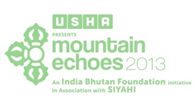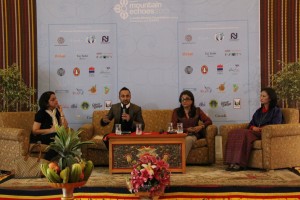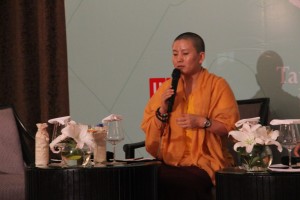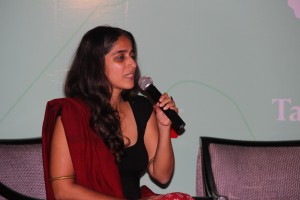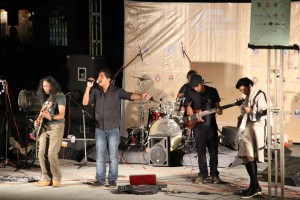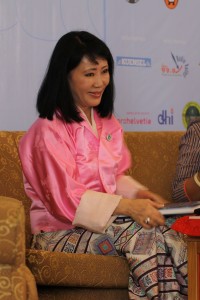Festival Director Namita Gokhale opened the first day of sessions of USHA Mountain Echoes 2013. The first session commenced with an engaging conversation between HM Ashi Dorji Wangmo Wangchuck and Namita Gokhale. They discussed the Queen Mother’s books, Rainbows and Clouds: The Life of Yab Ugyen Dorji as told to his Daughter and Treasures of the Thunder Dragon: A Portrait of Bhutan. The Queen Mother spoke about rural life in Bhutan with anecdotes from her own life while growing up. She spoke of the matriarchal values that form an integral part of Bhutanese culture.
To the question, “Why has Bhutan managed to hold on to their identity?” by NamitaGokhale, Her Majesty gave the simple yet profound answer, “We keep our identity because we love our identity.” Her hope for the rural educated youth to lead their communities is something that she has constantly been working towards at the Tarayana Foundation. She also read from her books.
Amish Tripathi conversed with Dolma Roder about his Shiva trilogy. He spoke not only of the story but the visual aspects of his work as well as the nuances that only aficionados notice. His words that we all are free to follow our separate paths and it is unfair to judge the path of any other person taught tolerance in the simplest and yet most honest of terms. He also talked about his innovative marketing strategies that have made the Shiva trilogy and astounding success.
Following the thread from HM Ashi Dorji Wangmo Wangchuck’s words, the session, Half the Sky: Women and the World began with a frank conversation between Rahul Bose, Aparna Sen, Lily Wangchuk and Namita Bhandare. Rahul and Aparna spoke of the change that has come over West Bengal and all of India where not only women’s safety is in question but the bigger challenge is the apathy of the bystanders. Rahul spoke of how men will always want to be ‘macho’ but the way to go is to change the concept of ‘macho’ to a man who understands that he should treat women just as he treats men. He insisted that the coming generation will be what we make of it and need to be taught by example. Aparna Sen gave a stark depiction of the changes that have come in Calcutta regarding women.
Lily Wangchuk talked of how women in power can bring more compassion and new perspectives and eventually lead to betterment of society as a whole. She talked of Bhutanese culture and the role women can play in this new democracy. Namita pointed out that a society that sees crime against women as crimes rather than dishonor is what is really required. Rahul concluded the session that the best thing to do is to make sexism uncool – to socially work towards changing the mindset of the people.
The presenting sponsors of the festival, USHA International plan to progress the India venture of USHA Silai Schools into Bhutan and this country has provided a perfect setting. The local NGO’s have been positive and it is hoped that with their help the company’s goal of rural women empowerment across remote villages of the country can be achieved.
Lyonpo Paljor Dorji and Dr. Lam Dorji were in conversation with Manju Wakhley in the first environmental session of the day. They took up the topics regarding the preservation of biodiversity and the understanding that needs to be incorporated into society. The second environmental session of the day was a conversation at Taj Tashi, between Saad Bin Jung and Lyonpo Paljor Dorji with their swapping bush stories and anecdotes that left the audience in splits. Saad also spoke about the elephants in the Nilgiris and how at times they can be more human than humans themselves.
The fifth session of the day and the first session at Taj Tashi saw Namita Gokhale speaking with Ani Choying about her book, Songs of Freedom. Ani spoke of the abuse she had suffered as a child and how her Guru helped her overcome her anger, hate and frustration and become a happier person. She sang thrice through the session leaving her audience spellbound and asking for an encore. She also spoke of women empowerment and how women bring color to the world while men, as shown by their dressing sense, are usually limited to black, white and grey.
Pavan K. Varma and Dasho Kinley Dorji were in conversation with Malvika Singh focusing on the changes that have recently come into the modes of communication. They spoke of how Bhutanese and Indian culture has been an oral tradition but now with the advent of social media that has changed drastically. Myriad topics from trolling, to the quick spread of information, the reach and the unlimited possibilities that have opened up were discussed. Pavan Varma and Dasho Kinley Dorji both discussed how regulating social media is impossible and not truly an option that should be considered.
AmrutaPatil showed her art from Kari and AdiParva in an exquisite presentation talking about graphic designing and her own interpretation of the Mahabharata. She spoke of the concept of the sutradhar andhow she has incorporated it into her work.
The concluding session of the day had Mahesh Dattani in conversation with Kalyan Ray. They discussed Mahesh’s body of work, from his plays to his ability to completely meld into the world he has portraying.
The music concert at the Clock Tower ended the day with a bang. The whole of Thimphu was dancing to the tunes of Bandish. The music left the audience cheering for an encore and gave the high note that the festival will start on tomorrow.

